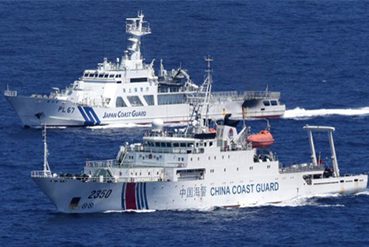Japan and China take small steps to prevent air and sea clashes in territorial areas of overlap
Chika Mori and Lee Jay Walker
Modern Tokyo Times

Prime Minister Shinzo Abe of Japan is extremely concerned by the intentions of China in areas of dispute with China. Alternatively, China, just like in the South China Sea, is adamant that its territorial rights must be protected at all costs. Therefore, the meeting between both nations to set up a communications hotline to prevent a possible air and sea clash took a small step forward.
Last month, Abe and Li Keqiang, the State Council of the People’s Republic of China, watched on tentatively during the signing of a Maritime and Aerial Communication Mechanism between both nations. Defense officials representing the political elites of Japan and China respectively signed the pact but clearly, the steps taken aren’t far-reaching at the moment.
Japan is concerned about areas related to the prefecture of Okinawa just like regional nations in the South China Sea fear China’s growing economic and military ventures. Hence, different opinions clearly exist between Japan and China because while the current agreement is limited, it took since 2007 to reach this point. This in itself shows the mutual distrust that exists between both parties.
Therefore, despite the system of emergency communications coming into place on June 8, it is far from a genuine hotline between both nations. Indeed, the limitations of current events did little to stem China from flying military aircraft near the Japanese prefecture of Okinawa since the signing that took place last month.
Equally important, in relation to the limitations, is that neither nation put anything into concrete whereby the boundaries of concern should be fixed. Of course, at least a link-up in radio communication is better than nothing and it is a start. Yet, suspicions remain between both nations. On top of this, the issue of American bases in Japan and China’s growing economic and military encroachment in the South China Sea confirms the complex geopolitical angle on the ground.
Overall, no genuine hotline still exists and the legal limitations are vague because nothing is binding. Hence, while it is true to say that confidence-building may develop that creates greater compliance and gradual strengthening. This is still far from a genuine hotline between both defense ministries. Therefore, concerns about China’s encroachment in parts of Japan’s territorial waters still persist.

Modern Tokyo News is part of the Modern Tokyo Times group
DONATIONS to SUPPORT MODERN TOKYO TIMES – please pay PayPal and DONATE to sawakoart@gmail.com
http://moderntokyotimes.com Modern Tokyo Times – International News and Japan News
http://sawakoart.com – Sawako Utsumi personal website and Modern Tokyo Times artist
https://moderntokyonews.com Modern Tokyo News – Tokyo News and International News
http://global-security-news.com Global Security News – Geopolitics and Terrorism
PLEASE JOIN ON TWITTER
https://twitter.com/MTT_News Modern Tokyo Times
PLEASE JOIN ON FACEBOOK